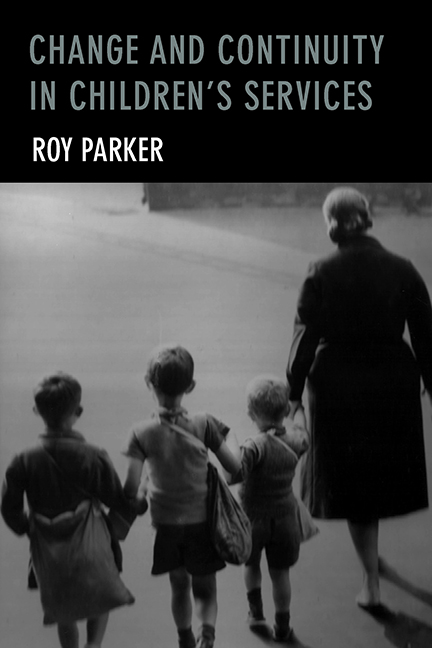Book contents
- Frontmatter
- Dedication
- Cover illustration
- Contents
- Acknowledgements
- Preface
- 1 Introduction: patterns of change and continuity
- 2 Residential child care: an historical perspective
- 3 From boarding-out to foster care
- 4 The evolution of landmark legislation
- 5 Getting started with the Children Act 1948: what do we learn?
- 6 Child care in the melting pot in the 1980s
- 7 Trends, transitions and tensions: children’s services since 101 the 1980s
- 8 Reflections on the assessment of outcomes in child care
- 9 The role and function of inquiries
- 10 Evidence, judgement, values and engagement
- 11 Emerging issues: looking ahead
- Notes and references
- Bibliography
- Index
6 - Child care in the melting pot in the 1980s
Published online by Cambridge University Press: 07 March 2022
- Frontmatter
- Dedication
- Cover illustration
- Contents
- Acknowledgements
- Preface
- 1 Introduction: patterns of change and continuity
- 2 Residential child care: an historical perspective
- 3 From boarding-out to foster care
- 4 The evolution of landmark legislation
- 5 Getting started with the Children Act 1948: what do we learn?
- 6 Child care in the melting pot in the 1980s
- 7 Trends, transitions and tensions: children’s services since 101 the 1980s
- 8 Reflections on the assessment of outcomes in child care
- 9 The role and function of inquiries
- 10 Evidence, judgement, values and engagement
- 11 Emerging issues: looking ahead
- Notes and references
- Bibliography
- Index
Summary
As explained in the preface, this chapter is my view of the state of the child care services in 1984. It has not been brought up to date and the use of the present tense refers to that time. This was deliberate because, standing largely as written, it provides an historical benchmark. It focuses mainly on what questions needed to be addressed in order to improve the standard of these services. In the light of subsequent events the reader might like to judge the accuracy of my analysis as well as the kind of progress that has been made since, perhaps with the help of subsequent chapters.
Our child care system has been shaped and sustained by powerful and persistent perceptions. These images have become so much a part of the way in which questions of policy and practice are approached that they generally pass unnoticed. Even when they are recognised they tend to be taken for granted. That is not surprising, for some of these images trace their origins back at least as far as the spate of child and family legislation of the 1880s. Yet we have reached a point where a reconsideration of these dominant perceptions is needed if improvements are to be made. Admittedly, many issues are being reassessed and important new developments are being introduced. But the framework of perceptions within which they occur remains much as it always has been; and that constrains the scope for imaginative reform. It is also liable to distort the way in which problems are defined. Both constraints and distortions arise because the conventional perspectives of child care are: (1) narrow, (2) undifferentiated, (3) static and (4) imitative.
I Narrowness
The debate about child care usually revolves around children for whom local authorities are more or less responsible. They owe their separate enumeration to the existence of the legal and administrative categories into which they fall. The problems that face these children and their families then come to be seen as of a different order (rather than of a different degree) from those that face many others as well. As a result policies are rarely located in the wider context of family and child policy. This becomes a hindrance to the energetic pursuit of prevention, integration and the alleviation of some of the serious disadvantages to which children are exposed.
- Type
- Chapter
- Information
- Change and Continuity in Children's Services , pp. 85 - 100Publisher: Bristol University PressPrint publication year: 2015



